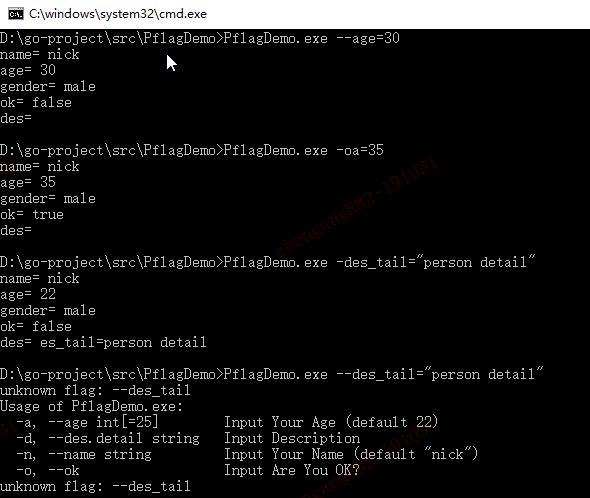现在晚上在家啃kubeadm的源码,
在啃源码前,pflag,viper,cobra这三件套好像是必须的,
那就先弄懂一下这三个套件的套路吧。
第一个,pflag.
https://www.cnblogs.com/sparkdev/p/10833186.html
https://github.com/spf13/pflag
pflag is a drop-in replacement for Go's flag package, implementing POSIX/GNU-style --flags.
pflag is compatible with the GNU extensions to the POSIX recommendations for command-line options. For a more precise description, see the "Command-line flag syntax" section below.
pflag 包与 flag 包的工作原理甚至是代码实现都是类似的,下面是 pflag 相对 flag 的一些优势:
- 支持更加精细的参数类型:例如,flag 只支持 uint 和 uint64,而 pflag 额外支持 uint8、uint16、int32 等类型。
- 支持更多参数类型:ip、ip mask、ip net、count、以及所有类型的 slice 类型。
- 兼容标准 flag 库的 Flag 和 FlagSet:pflag 更像是对 flag 的扩展。
- 原生支持更丰富的功能:支持 shorthand、deprecated、hidden 等高级功能。
package main
import flag "github.com/spf13/pflag"
import (
"fmt"
"strings"
)
// 定义命令行参数对应的变量
var cliName = flag.StringP("name", "n", "nick", "Input Your Name")
var cliAge = flag.IntP("age", "a", 22, "Input Your Age")
var cliGender = flag.StringP("gender", "g", "male", "Input Your Gender")
var cliOK = flag.BoolP("ok", "o", false, "Input Are You OK?")
var cliDes = flag.StringP("des-detail", "d", "", "Input Description")
var cliOldFlag = flag.StringP("badflag", "b", "just for test", "Input badflag")
func wordSepNomalizeFunc(f *flag.FlagSet, name string) flag.NormalizedName {
from := []string{"-", "_"}
to := "."
for _, sep := range from {
name = strings.Replace(name, sep, to, -1)
}
return flag.NormalizedName(name)
}
func main() {
// 设置标准化参数名称的函数
flag.CommandLine.SetNormalizeFunc(wordSepNomalizeFunc)
// 为 age 参数设置 NoOptDefVal
flag.Lookup("age").NoOptDefVal = "25"
// 把 badflag 参数标记为即将废弃的,请用户使用 des-detail 参数
flag.CommandLine.MarkDeprecated("badflag", "please use --des-detail instead")
// 把 badflag 参数的 shorthand 标记为即将废弃的,请用户使用 des-detail 的 shorthand 参数
flag.CommandLine.MarkShorthandDeprecated("badflag", "please use -d instead")
// 在帮助文档中隐藏参数 gender
flag.CommandLine.MarkHidden("gender")
// 把用户传递的命令行参数解析为对应变量的值
flag.Parse()
fmt.Println("name=", *cliName)
fmt.Println("age=", *cliAge)
fmt.Println("gender=", *cliGender)
fmt.Println("ok=", *cliOK)
fmt.Println("des=", *cliDes)
}
输出的样子:

最后,混用flag及pflag时,注意使用的方法
import (
goflag "flag"
flag "github.com/spf13/pflag"
)
var ip *int = flag.Int("flagname", 1234, "help message for flagname")
func main() {
flag.CommandLine.AddGoFlagSet(goflag.CommandLine)
flag.Parse()
}